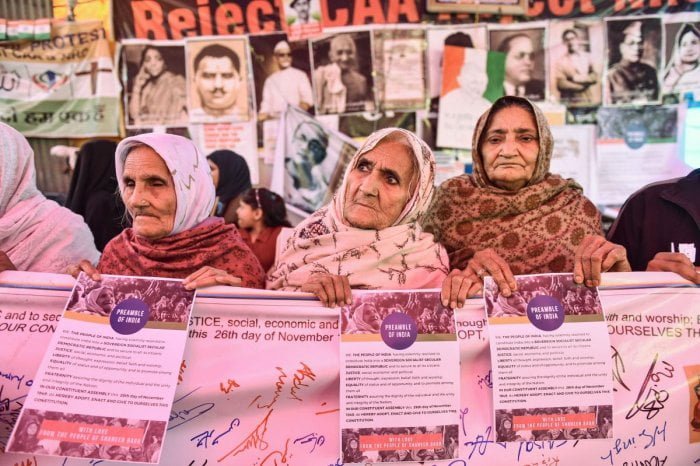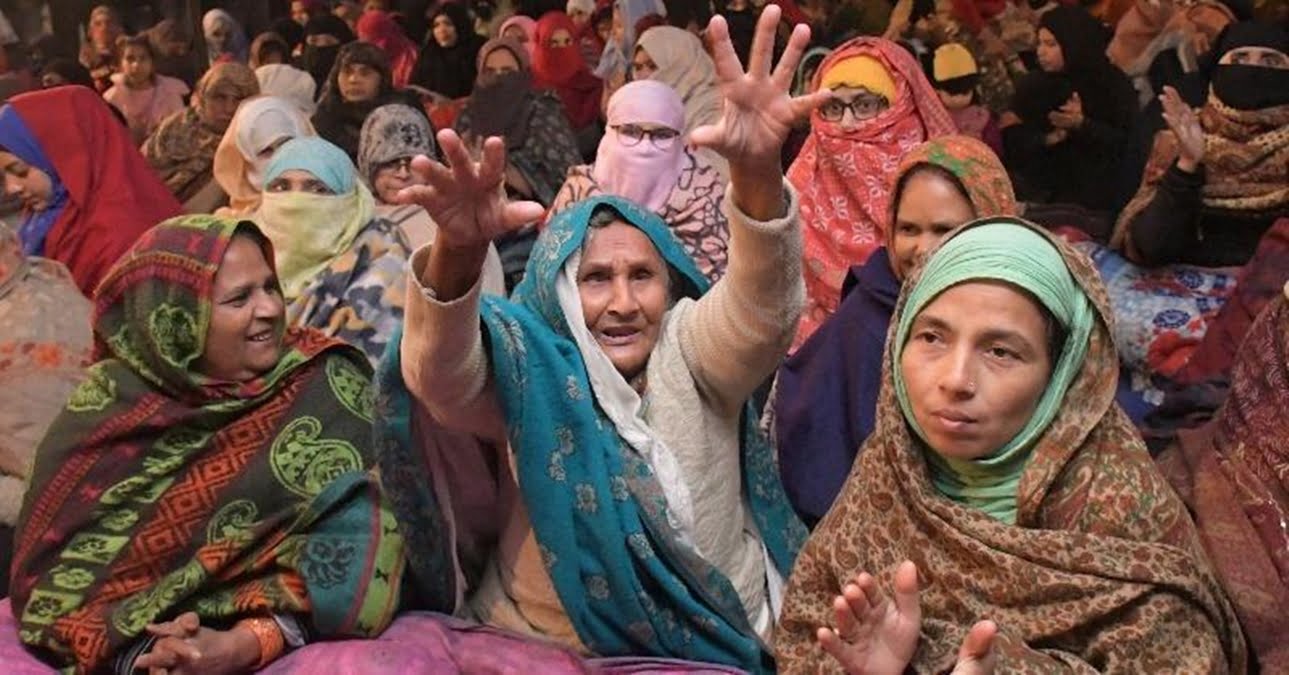Shaheen Bagh returned to national media after over 100 Muslim residents joined the BJP, on Sunday, August 16, 2020. The headlines read “Several members of the Muslim community in Shaheen Bagh join BJP months after anti-CAA protests.” While AAP alleged the 101-day protest a brainchild of BJP, the center ruling party retorted sternly.
In between all this, Shaheen Bagh, a woman’s movement, the assertion of minority voices was soon veiled behind the dominant political parties, propaganda, and allegations of malice. The protest that sparked similar protests nationwide was carefully picked apart and the Muslim women’s voices silenced. It was their rightfully earned space in the nation’s citizenship, a space fogged by the sudden scheme of political patriarchy ultimately silencing the same women whose assertions were hailed when the anti CAA/NRC protests were going strong.
Adesh Gupta, Delhi BJP President told media on the public conversion of the Muslim minority into the party, that “these people were influenced by BJP’s effort to reach out to everyone, and not use them as a vote bank.” The people of Shaheen Bagh still remain ‘these people’ and not ‘our people’, their membership in the national party does not confirm an equal treatment but cements them as the ‘other’.
Adesh Gupta, Delhi BJP President told media on the public conversion of the Muslim minority into the party, that “these people were influenced by BJP’s effort to reach out to everyone, and not use them as a vote bank.” Thus, the people of Shaheen Bagh still remain ‘these people’ and not ‘our people’.
Also read: If We Don’t Support Shaheen Bagh Women’s Agency, We Aren’t Allies To Their Movement
Meanwhile, the dadis of Shaheen Bagh take a back seat. The lingering question remains, what happens to the woman’s movement that survived the freezing winters? What becomes of the Citizenship Act they fought against? What narrative justifies the death of an infant who died enduring the nights of protest? Or was it all just collateral damage in the wake of a bigger picture painted by the patriarchs?
Shahzad Ali, a social activist who claims to be a protestor at Shaheen Bagh unhesitatingly claims that CAA is an issue he will take up with the national representatives of his newly-joined party. He explains how important it is to indulge in a ‘dialogue’ for any possibility of change and how the Muslim women were ‘gumraah’, in an interview with The Wire. Asif Anis, an architect who also joined BJP on Sunday clarifies how the “protest was never against any party but the Act…” and how we should all together fight against the ‘Bigger Crisis’. While the gynecologist Dr. Mehreen and former AAP worker Tabassum Hussain had nothing relevant to say on their decision of joining BJP, with this decision, they silenced the millions of women who had taken to roads, in their act of politicising the protest.
‘The Bigger Crisis’ that Asif Anis refers to, is a tried and tested patriarchal narrative, a tool that reduced the women of Shaheen Bagh, just like other women pioneers from history, to mere plot points in the construction of a bigger picture. The fight for Independence witnessed millions of women revolutionaries who contributed to the Independence struggle financially, physically, emotionally, and psychologically but they have all been forgotten under the wake of a bigger picture.
The nineteenth-century freedom struggle constructed a nationalism narrative where women were involved in the public space and were made important members of the protest, for they sacrificed for the bigger picture, but as soon as the project was complete, they were pushed to behind the home thresholds.
Women have always been a negation in the vocabulary of patriarchy; a pause, a silence, and an abjection. Women activists like Swarnakumari Debi, Sarala Debi, Kumudini Mitra, Madame Bhikaji Cama, and many more were instrumental in the freedom struggle. The twenty-first-century memory of the Independence struggle celebrates Nehru, Gandhi, Bose but forgets these and million other women that fought despite the fetters of society. They are forgotten and their voices muffled in the ‘bigger picture’ of a nation they sacrificed to build.
The national media headlines and debates construct the narrative of Shaheen Bagh joining BJP, but how many have talked to the women who sacrificed their families and stepped out of their homes to assert the citizenship they want in a nation they built?

The national media headlines and debates construct the narrative of Shaheen Bagh joining BJP, but how many have talked to the women who sacrificed their families and stepped out of their homes to assert the citizenship they want in a nation they built? The few that go the extra mile have recorded interviews of Gulabo, a Shaheen Bagh dadi, and Asma Abdullah, an NGO worker; both of whom are baffled by the obscene representation of their protest on the political stage. They kept reiterating that their protest had no leader and the people who are claiming associations were hardly ever even witnessed regulating traffic and lurking around the premises, and never as actively protesting.
The media representation of the Muslim residents joining BJP and the political parties bantering over the conspiracy of polarising Delhi public before elections further demean the Muslim women’s voices. The patriarchal hegemony is at its best constructing a narrative revolving around those with an agency, and silencing the actual voices of protest.
Also read: Women’s Agency In Shaheen Bagh And In Other Protests Against CAA
The party that claimed the minority was the enemy, has ‘benevolently” taken a few Muslim people under its wing, yet continuing to otherise them. The parties that never mustered the courage to have a conversation with the women who were protesting at Shaheen Bagh have now begun the classic blame-game.
The media that must report the voice of the voiceless has vigorously covered the stage of conversion and explained both sides of political patriarchal power structures, largely invisibilising the women’s protests except as using them as “representational images” or “file footage”. In the game of patriarchy, amidst the representation and slander, women have once again been silenced. Shaheen Bagh would now be a site of political debate and not a reminisce of women’s assertion and mobilisation for a minority community’s citizenship rights.
Featured Image Source: India Times
About the author(s)
Dr. Guni Vats is an Assistant Professor at the Department of English, Manav Rachna International Institute of Research and Studies. A PhD in Gender Studies, she is a renowned researcher, writer, and scholar.





